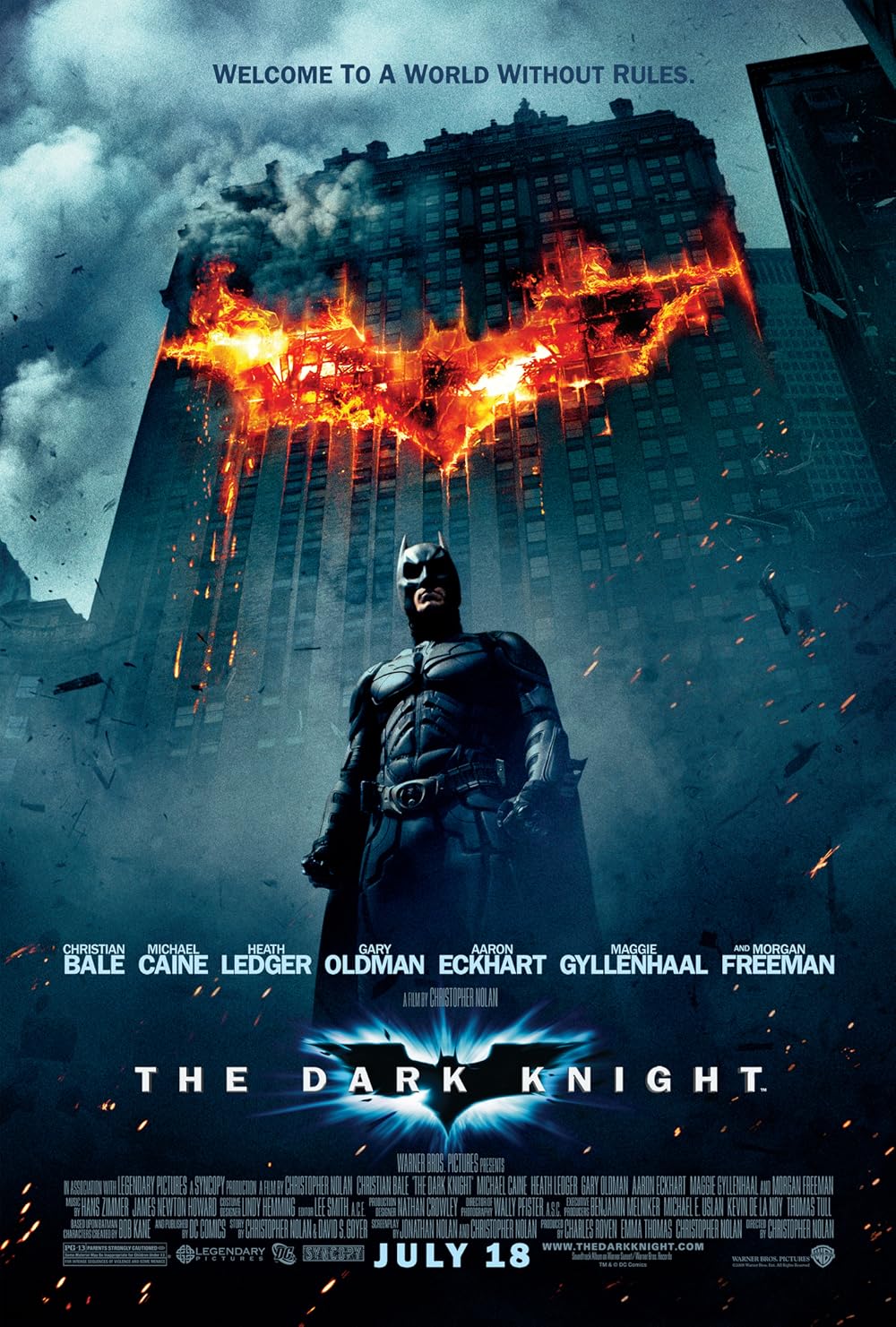


The Dark Knight revolutionized superhero cinema when it premiered on July 18, 2008, transcending the genre to become a legitimate crime epic that earned critical acclaim and commercial triumph. This 2-hour and 32-minute action/crime/drama masterpiece holds an exceptional 9.1/10 IMDb rating from over 3.1 million votes, cementing its status as one of the greatest films ever made.
Christopher Nolan's visionary direction combined with Heath Ledger's legendary Joker performance created a cultural phenomenon that redefined what superhero films could achieve. Watch The Dark Knight to experience the film that proved comic book adaptations could deliver Oscar-worthy performances and sophisticated storytelling.
The Dark Knight cast features career-defining performances that elevated superhero cinema to new artistic heights. Christian Bale delivers a nuanced portrayal of Bruce Wayne/Batman, balancing the billionaire playboy facade with the tortured vigilante beneath. However, Heath Ledger's Joker steals every scene with a performance so transformative it earned him a posthumous Academy Award for Best Supporting Actor.
The ensemble supporting cast includes Aaron Eckhart as Harvey Dent/Two-Face, whose tragic transformation anchors the film's moral complexity. Gary Oldman brings gravitas to Commissioner Gordon, while Michael Caine's Alfred provides emotional depth and Morgan Freeman's Lucius Fox offers technological expertise and ethical counsel. Maggie Gyllenhaal replaced Katie Holmes as Rachel Dawes, bringing fresh energy to Bruce Wayne's moral compass.
Heath Ledger Joker Dark Knight performance represents one of cinema's most iconic villain portrayals. The actor's complete immersion into the role included developing the character's unsettling mannerisms, distinctive voice, and anarchic philosophy. Ledger's Joker transcends typical comic book villainy to embody chaos itself, challenging Batman's methods and Gotham's moral foundation.
The late actor's preparation was legendary—isolating himself for weeks, keeping a character diary, and developing the Joker's psychological profile with meticulous detail. His improvised moments, like the hospital explosion scene and his chilling interrogation room performance, showcase an artist working at peak creative power throughout the 152-minute runtime.
Christopher Nolan Batman film direction brought unprecedented realism and thematic depth to superhero cinema. The director's insistence on practical effects over CGI created visceral action sequences, from the truck flip to the hospital demolition, that ground the film in tangible reality despite its fantastic premise.
Moreover, Nolan's visual storytelling throughout the substantial runtime explores themes of surveillance, civil liberties, and moral compromise in the face of terrorism. The Dark Knight trilogy middle chapter uses Batman's struggle against the Joker as a meditation on order versus chaos, examining how far society should go to combat those who reject all rules.
The film's technical achievements deserve recognition within the action/crime/drama category. Wally Pfister's cinematography, including groundbreaking IMAX sequences, creates stunning visual scope that influenced countless subsequent blockbusters. Hans Zimmer and James Newton Howard's pulsing score, particularly the Joker's rising tension motif, provides aural intensity that amplifies the narrative's psychological warfare.
Movie Details:
The Dark Knight explores themes of heroism, sacrifice, and moral ambiguity throughout its 152-minute narrative. The film's examination of surveillance ethics, exemplified by Batman's sonar system, resonated with post-9/11 audiences grappling with security versus privacy debates. The Joker's social experiments force characters and viewers to confront uncomfortable questions about human nature under pressure.
Furthermore, Harvey Dent's transformation into Two-Face illustrates how quickly idealism can corrupt when faced with tragedy. The film's exploration of Batman as both hero and outlaw, accepting blame for Dent's crimes to preserve Gotham's hope, elevates the narrative beyond simple good-versus-evil dynamics.
Since its release, The Dark Knight has influenced countless superhero films attempting to replicate its tonal sophistication and thematic depth. The movie's commercial and critical success proved that comic book adaptations could achieve both artistic legitimacy and massive box office returns, paving the way for modern superhero cinema's dominance.
Additionally, the film's impact extends beyond entertainment into serious cultural discourse. The Joker's philosophical anarchism and Batman's utilitarian pragmatism sparked debates about justice, morality, and the social contract that continue resonating today.
Where to watch The Dark Knight options now include numerous streaming platforms offering high-definition viewing quality worthy of this cinematic achievement. The film's substantial 152-minute runtime benefits from uninterrupted streaming that preserves Nolan's carefully constructed tension and thematic development.
Premium IPTV services provide superior quality for experiencing The Dark Knight trilogy's central chapter. The enhanced viewing experience includes optional commentary tracks and extensive behind-the-scenes documentaries exploring the film's revolutionary production techniques and tragic circumstances surrounding Ledger's death.
Available Viewing Formats:
The Dark Knight Rises completed Christopher Nolan's trilogy in 2012, bringing closure to Bruce Wayne's journey eight years after the events of this film. Tom Hardy's Bane provided a physically imposing threat distinct from Ledger's psychological terrorism, while Anne Hathaway's Selina Kyle added complexity to Batman's final chapter.
The Dark Knight Rises cast built upon the established foundation, introducing new characters while honoring the legacy of Harvey Dent's sacrifice and the Joker's impact on Gotham's psyche. Together, the trilogy totals over seven hours of storytelling that redefined superhero cinema's possibilities.
The Dark Knight movie production faced immense challenges, from coordinating massive practical stunts to the tragedy of Heath Ledger's death during post-production. Christopher Nolan's commitment to practical effects required meticulous planning, including actually flipping an 18-wheel truck on Chicago streets and demolishing a real building for the hospital scene.
Furthermore, the 152-minute runtime allowed proper development of multiple character arcs and thematic explorations that shorter films couldn't achieve. The decision to shoot key sequences in IMAX format created unprecedented visual scale for superhero cinema.
The Dark Knight cast assembly initially raised questions when Heath Ledger was announced as the Joker. Many fans doubted the actor known for romantic roles could portray Batman's arch-nemesis. However, Ledger's transformative performance silenced all criticism, creating the definitive screen version of the character.
Similarly, replacing Katie Holmes with Maggie Gyllenhaal as Rachel Dawes generated discussion, but Gyllenhaal brought gravitas to the role that served the film's more mature themes. Aaron Eckhart's casting as Harvey Dent proved inspired, as he convincingly portrayed both the idealistic district attorney and his vengeful alter ego.
The film's opening bank heist establishes the Joker's modus operandi—elaborate planning masked as chaos, betraying accomplices, and theatrical flair. The sequence sets the tone for the entire 152-minute experience, introducing the antagonist who will dismantle Gotham's power structure.
The Dark Knight interrogation room scene represents the film's thematic core. Batman and Joker's psychological warfare reveals their fundamental opposition: Batman believes people are inherently good and worth saving, while Joker argues civilization is a thin veneer concealing humanity's savage nature.
The hospital explosion sequence showcases both technical excellence and character development. Ledger's improvised reaction to the delayed explosion (actually a planned pause for dramatic effect) became iconic, while Harvey Dent's corruption reaches completion. The scene's practical effects—demolishing a real building—created authentic spectacle impossible to replicate with CGI.
The Joker's social experiment with two ferries loaded with explosives tests his cynical worldview against Gotham's capacity for decency. The scene's resolution—both ferries choosing not to destroy the other—suggests hope for humanity while acknowledging the darkness Joker exposed. This moral complexity distinguishes The Dark Knight from typical superhero fare.
The Dark Knight established the template for "serious" superhero cinema that influenced the entire genre's evolution. The film proved that comic book adaptations could tackle complex themes, deliver nuanced performances, and achieve critical acclaim previously reserved for prestigious dramas.
Furthermore, film schools worldwide study The Dark Knight as a masterclass in blockbuster filmmaking that doesn't sacrifice artistic integrity. The movie's success demonstrated that audiences would embrace challenging narratives when properly executed across a substantial runtime.
The film earned eight Academy Award nominations, winning two: Best Supporting Actor for Heath Ledger and Best Sound Editing. The Dark Knight's exclusion from Best Picture consideration sparked controversy that ultimately led to expanding the category from five to ten nominees.
The movie consistently appears on "greatest films" lists, with many critics considering it not just the best superhero film but one of the finest crime dramas ever made. The American Film Institute recognized it among the top ten films of 2008.
Heath Ledger Joker Dark Knight philosophy presents chaos as liberation from social constructs and moral hypocrisy. His famous "agent of chaos" speech articulates a worldview where plans and schemes represent humanity's futile attempts to control an inherently random universe. This existential perspective elevates the character beyond typical villain motivations.
The Joker's experiments throughout the 152-minute narrative—forcing Batman to choose between saving Harvey or Rachel, turning Gotham's White Knight into a monster, orchestrating the ferry dilemma—systematically attack the foundations of civilized society. His success in corrupting Harvey Dent proves his point about humanity's fragility.
Christian Bale's Batman faces escalating moral compromises throughout the film. From employing illegal surveillance to taking blame for murders he didn't commit, Bruce Wayne's journey explores how far heroes can bend ethical rules before becoming the villains they fight.
The film's conclusion—Batman accepting villain status to preserve Harvey Dent's heroic image—represents ultimate self-sacrifice. The Dark Knight title's irony becomes clear: Gotham's true hero must embrace darkness to protect the city's hope.
The Dark Knight transcends its action/crime/drama category to become essential cinema that rewards multiple viewings across its substantial 152-minute runtime. The film's examination of heroism, terrorism, and social responsibility remains relevant to contemporary audiences while showcasing filmmaking excellence that established new standards for blockbuster entertainment.
Whether experiencing this masterpiece for the first time or revisiting its complex pleasures, watch The Dark Knight streaming through premium IPTV services ensures optimal viewing quality that honors Christopher Nolan's artistic vision and Heath Ledger's legendary final complete performance.
The Dark Knight stands as proof that superhero films can achieve both popular success and artistic legitimacy, creating lasting cultural impact that extends far beyond its theatrical release. This foundational work of modern superhero cinema continues inspiring filmmakers while entertaining audiences worldwide.
(for customer service and support)
(for new customers)